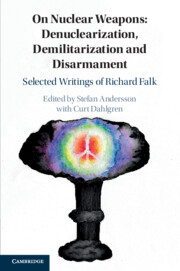 On Nuclear Weapons: Denuclearization, Demilitarization and Disarmament
On Nuclear Weapons: Denuclearization, Demilitarization and Disarmament Book contents
- On Nuclear Weapons: Essays by Richard Falk on Denuclearization, Demilitarization, and Disarmament
- On Nuclear Weapons: Essays by Richard Falk on Denuclearization, Demilitarization, and Disarmament
- Copyright page
- Dedication
- Epigraph
- Contents
- Foreword by Zia Mian
- Preface by Richard Falk
- Acknowledgments
- Part I International Law and World Order
- Part II Impacts of Democracy, Neutrality, and National Interest
- Part III Nuclear Policy Initiatives
- Part IV Remembering the Past, Encountering the Future
- Contents
- 16 The Paucity of the Millennial Moment
- 17 The Nuclear Challenge after Seventy Years
- 18 The Spirit of Thoreau in the Age of Trident
- Index
16 - The Paucity of the Millennial Moment
The Case of Nuclearism
from Part IV - Remembering the Past, Encountering the Future
Published online by Cambridge University Press: 04 July 2019
- On Nuclear Weapons: Essays by Richard Falk on Denuclearization, Demilitarization, and Disarmament
- On Nuclear Weapons: Essays by Richard Falk on Denuclearization, Demilitarization, and Disarmament
- Copyright page
- Dedication
- Epigraph
- Contents
- Foreword by Zia Mian
- Preface by Richard Falk
- Acknowledgments
- Part I International Law and World Order
- Part II Impacts of Democracy, Neutrality, and National Interest
- Part III Nuclear Policy Initiatives
- Part IV Remembering the Past, Encountering the Future
- Contents
- 16 The Paucity of the Millennial Moment
- 17 The Nuclear Challenge after Seventy Years
- 18 The Spirit of Thoreau in the Age of Trident
- Index
Summary
With the advent of a new millennium, there exists a strong cultural presumption that the search for terrestrial answers will grow bolder, veering as it did in the 1980s toward radical visions of an imminent apocalypse or else the start of an extraordinary reign on earth of the divine spirit. Yet instead, in the 1990s there exists a pervasive sense of complacency, a turning toward immediate satisfactions, and an imaginative fatigue that is seemingly content with muddling through, barely taking more than ritualistic notice of the millennial shift that awaits us. William Gibson, already in 1984, captured the distinctive mood of our era in the revelatory opening sentence of his classic Neuromancer: “The sky above the port was the color of television tuned to a dead channel.” Perhaps this dullness of outlook is highly provisional and will soon be superseded by a more dramatic and visionary set of expectations; but there are currently few indications that this might happen, by some sort of retuning process in the next several years, a last-hour recovery of imaginative vividness before crossing the threshold of a new millennium.
- Type
- Chapter
- Information
- On Nuclear Weapons: Denuclearization, Demilitarization and DisarmamentSelected Writings of Richard Falk, pp. 293 - 304Publisher: Cambridge University PressPrint publication year: 2019
